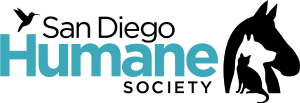Puppies: Puppy Vaccinations and Socialization
Puppies grow and learn a lot during their first few months of life. Proper veterinary care and socialization are key to helping puppies become healthy, happy dogs. Before taking your young pup on adventures, make sure they’ve had their first vaccination!
When should my dog be vaccinated?
Dogs should receive their first vaccination, DHPP (for Distemper, Adenovirus, Parvovirus, Parainfluenza), at 6-8 weeks of age. The vaccine should be administered again every 3-4 weeks until 16-20 weeks of age. (Booster vaccines are typically required every 1-3 years.) A puppy’s initial rabies vaccination is typically given at 3 months of age and is valid for 1 year. All subsequent, booster rabies vaccinations are valid for 3 years.
Where should my dog be vaccinated?
Puppies can be vaccinated at any veterinary practice. San Diego Humane Society offers low-cost vaccines and microchipping clinics at multiple campus locations. Please note that a vaccination clinic is not a substitute for proper veterinary care. In addition to vaccination against disease, all pets need regular veterinary checkups. A veterinarian will help you keep your pet healthy and prevent illness by monitoring your pet’s overall wellness and noticing changes over time. Regular veterinary care will help keep your pet healthy for years to come!
Will my dog feel sick after being vaccinated?
It is normal after vaccinations for pets to have a low-grade fever and muscle aches. Your pet may eat less and sleep more 24-48 hours after. Rarely, pets will have an allergic reaction, such as hives, swelling of the face, vomiting or diarrhea. If your pet has any of the aforementioned symptoms, please take your pet to the nearest emergency clinic for immediate treatment. Severe reactions, although rare, can become fatal if left untreated. Notify your veterinarian of any adverse reactions so they can take steps to prevent a recurrence with your pet’s future vaccinations.
When should I start socializing my puppy?
The first three months of your puppy’s life is the most important time to expose them to as many new people, animals, stimuli and environments as possible so they can learn to behave and interact successfully with the world around them. Puppy classes and playgroups are for puppies 8-16 weeks old with proof of vaccination at least 7 days before the start of class. For puppies 16 weeks and up, we also offer adolescent classes and other socialization and training support, such as the free weekly Well-Socialized Pet Chat via Zoom. Designed for those with young pets, these chats are appropriate for owners of pets of all ages and rotate among these topics:
- How pets learn.
- Desensitizing pets to sounds.
- Socializing with animals and people.
- Helping pets be comfortable being handled.
- Exposing pets to new objects and experiences.
Early socialization and positive training can go a long way to creating a lifelong bond between you and your dog.
 How should I socialize my puppy?
How should I socialize my puppy?
Here is a Puppy Socialization Checklist to help! Taking a puppy class helps with training, strengthening the human-animal bond and socializing puppies in a setting where the risk of illness can be minimized. You should also socialize your pup one-on-one with dogs you know are already vaccinated. Once your little pooch is fully vaccinated, you can safely bring them to more public places to learn and play. We recommend waiting to take puppies to beaches and dog parks until they are least 6 months old and have had many positive experiences with other well-socialized dogs. Waiting 6 months gives you time to focus on proper socialization. Giving your puppy 100 positive experiences with other animals is a good goal to strive for. If your puppy has 100 positive experiences with other dogs and one not-so-great experience, they are much more likely to bounce back from that negative experience.
Should I wait to socialize my puppy until fully vaccinated?
No! We support the American Veterinary Society of Animal Behavior’s recommendation that puppies receive socialization before they are fully vaccinated. The first three months is the primary window of opportunity for puppies to adapt to new people, animals and experiences. Good socialization decreases the potential for behavior problems (such as fear and aggression) and relinquishment to shelters.

